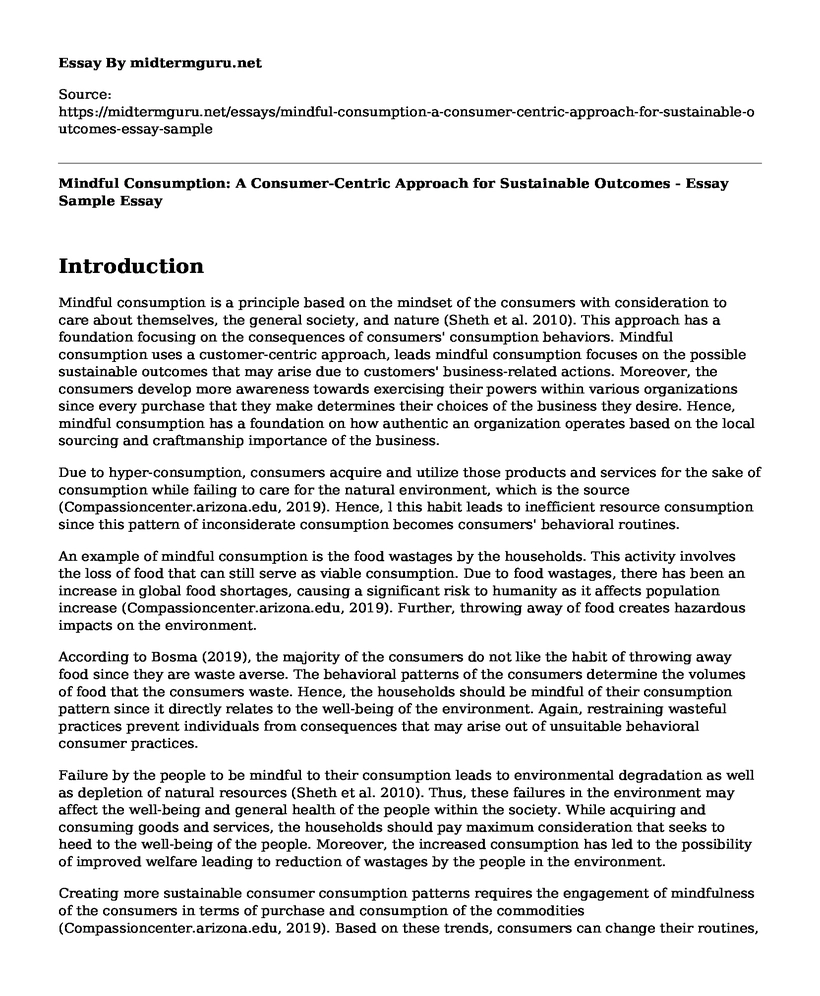Introduction
Mindful consumption is a principle based on the mindset of the consumers with consideration to care about themselves, the general society, and nature (Sheth et al. 2010). This approach has a foundation focusing on the consequences of consumers' consumption behaviors. Mindful consumption uses a customer-centric approach, leads mindful consumption focuses on the possible sustainable outcomes that may arise due to customers' business-related actions. Moreover, the consumers develop more awareness towards exercising their powers within various organizations since every purchase that they make determines their choices of the business they desire. Hence, mindful consumption has a foundation on how authentic an organization operates based on the local sourcing and craftmanship importance of the business.
Due to hyper-consumption, consumers acquire and utilize those products and services for the sake of consumption while failing to care for the natural environment, which is the source (Compassioncenter.arizona.edu, 2019). Hence, l this habit leads to inefficient resource consumption since this pattern of inconsiderate consumption becomes consumers' behavioral routines.
An example of mindful consumption is the food wastages by the households. This activity involves the loss of food that can still serve as viable consumption. Due to food wastages, there has been an increase in global food shortages, causing a significant risk to humanity as it affects population increase (Compassioncenter.arizona.edu, 2019). Further, throwing away of food creates hazardous impacts on the environment.
According to Bosma (2019), the majority of the consumers do not like the habit of throwing away food since they are waste averse. The behavioral patterns of the consumers determine the volumes of food that the consumers waste. Hence, the households should be mindful of their consumption pattern since it directly relates to the well-being of the environment. Again, restraining wasteful practices prevent individuals from consequences that may arise out of unsuitable behavioral consumer practices.
Failure by the people to be mindful to their consumption leads to environmental degradation as well as depletion of natural resources (Sheth et al. 2010). Thus, these failures in the environment may affect the well-being and general health of the people within the society. While acquiring and consuming goods and services, the households should pay maximum consideration that seeks to heed to the well-being of the people. Moreover, the increased consumption has led to the possibility of improved welfare leading to reduction of wastages by the people in the environment.
Creating more sustainable consumer consumption patterns requires the engagement of mindfulness of the consumers in terms of purchase and consumption of the commodities (Compassioncenter.arizona.edu, 2019). Based on these trends, consumers can change their routines, leading to more sustainable patterns in consumption that help in the reduction of wastages. Therefore, maintaining environmental safety and subsequent well-being of the consumers. Sheth et al. 2010 sate that overconsumption by the households may lead to the detraction of the communities from providing care to the natural resources in the environment.
Hence, it is the sole duty of the consumers to be mindful of their consumption patterns to help in safeguarding the environment and their well-being.
References
Bosma, E. (2019). Trend: Mindful consumption | Extend Limits. [online] Extend Limits. Available at: https://www.extendlimits.nl/en/trends/onderwerp/trend-mindful-consumption [Accessed 17 Aug. 2019].
Compassioncenter.arizona.edu. (2019). [online] Available at: https://compassioncenter.arizona.edu/sites/compassioncenter.arizona.edu/files/ICCR_Helm_Exploring%20MC.pdf [Accessed 17 Aug. 2019].
Sheth, J., Sethia, N., and Srinivas, S. (2010). Mindful consumption: a customer-centric approach to sustainability. Journal of the Academy of Marketing Science, 39(1), pp.21-39.
Cite this page
Mindful Consumption: A Consumer-Centric Approach for Sustainable Outcomes - Essay Sample. (2023, Feb 07). Retrieved from https://midtermguru.com/essays/mindful-consumption-a-consumer-centric-approach-for-sustainable-outcomes-essay-sample
If you are the original author of this essay and no longer wish to have it published on the midtermguru.com website, please click below to request its removal:
- Business Ethics Reflection Paper
- Essay on Small Business Management
- Essay on Difference Between Restaurant and Hotel
- Essay on Agents Rights and Liabilities
- Anarchy in Fight Club by Chuck Palahniuk - Literary Analysis Essay
- Research Paper on Dangers of Genetically Modified Foods
- Organizational Culture: The Key to Adaptability and Growth - Research Paper







